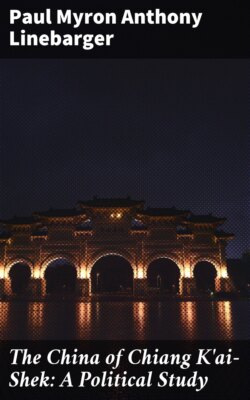Читать книгу The China of Chiang K'ai-Shek: A Political Study - Paul Myron Anthony Linebarger - Страница 15
На сайте Литреса книга снята с продажи.
Chapter II
THE POLITICAL ORGANS OF THE NATIONAL GOVERNMENT
ОглавлениеTable of Contents
By constitutional stipulation, and by dogma legally established, the National Government of the Chinese Republic is a Kuomintang Party-dictatorship over the Chinese nation. This rule is formally dictatorship by a minority democracy over the absolutely governed majority, since the Party constitution requires intra-Party democracy. No pretense is made of further formal democracy. Actual experience of the past ten years has shown the government to be a broad, loosely organized oligarchy in which the Party, the Government, the Army and regional military, and independent leaders (such as bankers, college professors and presidents, secret society chiefs, community spokesmen) have shared power. The center of gravity has stayed somewhere near Chiang K'ai-shek, who as co-leader and then formal Chief (Tsung-ts'ai, "general ruler") of the Party and creator of the central army has combined two of the chief sources of influence. Variety in the sources, nature, and incidence of political power in recent Chinese affairs has, however, not destroyed the constitutional theory: Party-dictatorship pledged to national democracy.
The state machinery—as it has been since promulgation of the Provisional Constitution, 1931—is among the most elaborate in the modern world, but is nevertheless effective. One may justly regard the present government as the most efficacious, generally powerful, and growing Chinese government since the mid-eighteenth century. This government is pre-eminently the creation of the Kuomintang, and of Kuomintang leaders. A war which threatens China's national existence accordingly threatens the leaders as government officers, as Party members, as patriotic citizens, and as members of the Chinese race. At the time that they fight an alien enemy, they must simultaneously increase state power and diffuse it so that a democracy may emerge and survive.
China's leadership is therefore posed a two-fold problem: to perpetuate a regime, successful in one period of relative peace, through years of invasion to a period of even deeper peace; and to permit popular access to policy-forming agencies, allowing freer operation of pressures, without endangering resistance and reconstruction thereby. To the Western political scientist, it is amazing that they have carried into the years of catastrophic war a unique, complex constitutional system, treasuring it like an ark of the covenant. This is the five-power system.
